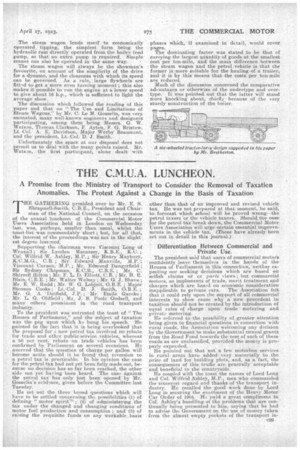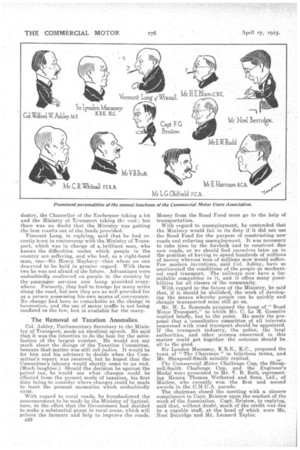THE C.M.U.A. LUNCHEON.
Page 13

Page 14

If you've noticed an error in this article please click here to report it so we can fix it.
A Promise from the Ministry of Transport to Consider the Removal of Taxation Anomalies. The Protest Against a Change in the Basis of Taxation
THE GATHERING presided over by Mr. E. S. Shrapnell-Sinith, C.B.E., President and Chairman of the National Council, on the occasionof the annual luncheon of the Commercial Motor Users Association held in London on Wednesday last, was, perhaps, smaller than usual, whilst the toast-list was commendably short ; but, for all that, the interest of the proceedings was not in the Slightest degree lessened.
Supporting the chairman were viscount Long of lArraxall ; Sir Lynden Macassey, R.B.E., K.C. ; Col. Wilfrid W. Ashley, M.P.; Sir Henry Maybury, K.C.M.G.' 0.13.; Sir Edward Manville, M.P. ; ,Viscount Curzon, M.P. ; Mr. Edmund Dangerfield ; Sir. Sydney Chapman, K.C.B., C.B.E. ; Mr. C. Shirreff Hilton ; Mr. F. L D. Elliott, C.B. ; Mr. H. E. Blain, C.B.E. ; Mr. Walter Wolsey ; Mr. G. J. Shave ; Mr. E. W. Rudd ; Mr. W. G. Lobjeit, 0.B.E. ; Major Stensein Cooke ; Lt..--Col. D. J. Smith, 0.B.E. ; Mr. G. A. Dutfield, .I.P. ; Mr. Emile Garcke ; Mr. L. Go Oldfield ; Mr. J. S. Poole Godsell, and many others prominent in the road transport industry. .
To the president was entrusted the toast of " The Houses of Parliament," and the subject of taxation waa the peg upon which he hung his speech. • Be pointed to the fact that it is being overlooked that the proposal for a new petrol tax involved no rebate for trade and other public-service vehicles, whereas a 60 ner cent. rebate on trade vehicles has been confirmed by Parliament on several occasions. He averred that the question of charge per gallon will become acute should it be found that reversion to • a petrol tax is practicable. In his opinion the case for the petrol tax had not yet been fully made out, because no decision has so far been reached, the other side not yet having been heard. The case against the petrol tax has only just been opened. by Mr. Gosselin's evidence, given before the Committee last Tuesday.
He set out the three broad questions which will have to be settled concerning the possibilities (1) of defining " motor spirit" ; (2) of administering the tax under the changed and changing conditions of motor fuel production and consumption ; and (3) of raising the requisite funds on any workable. basis other than that of an improved and revised vehicle tax. He was not prepared at that moment, he said, toforecast which school will be proved wrong—the petrol taken or the vehicle taxers. Should the ease for the petrol tax break down, the Commercial Motor Users Association will urge certain essential improvements in the vehicle tax. (These have already been set out in detail in this journal.)'
Differentiation Between Commercial and Private Use.
The president said that users of commercial motois confidently leave themselves in the hands of the Houses of Parliament in this connection, neither expecting nor seeking decisions which are based on selfish claims or ex parte views ; but commereial motors, as implements of trade, merit tteatment and charges which are based on economic consideration
inapplicable to private ears. The Association felt that it could rely upon the support of all commercial interests to show cause why a new precedent in taxation should not be created by the introduction of equal rates of charge upon trade motoring and priVat.?. motoring,
He referredto the possibility of greater attention being given to financial questions in connection with rural roads, the Association welcoming any decision by the Government to-make substantial annual gaiants. from the Road Fund towards the cost of such of these roads as are unclassified, provided the money' is properly expended.
He pointed out that not a few motorbus services in rural areas have added very materially to the price of land for lauildin plots, and, as a fact, the consequences of this traffic are generally acceptable and beneficial to the countryside. He coupled with the toast the names of Lord Long and Col. Wilfrid Ashley, M.P., men who commanded the sincerest. regard and thanks of the transport industry. He recalled the good work done by Lord Long in securing the enactment of the Heavy Motor Car Order of 1904. He paid a great compliment to Col. Ashley's handling of the problems that are continually being presented to him, saying that he had to advise the Government on the use of money taken from the almost empty pockets of the transport in dustry, the Chancellor of the Exchequer taking a lot and the Ministry of Transport taking the rest ; but there was no doubt that the Ministry was getting the best results out of the funds provided.
Viscount Long, in replying, said that he had recently been in controversy with the Ministry of Transport, which was in charge of a .brillia-nt man, who knows the difficulties under which people in the country are suffering, and who had, as a right-hand man, one—Sir Henry, Maybury—than whom no one deserved to be held in greater regard. With these two he was not afraid of the future. Advantages were undoubtedly conferred en people in the country by the passenger services now being provided everywhere. Formerly, they had to trudge for many miles along the road, but now they are as well provided for as a person possessing his-own means of conveyance. No change had been so remarkable as the change in locomotion, and the use of motor traffic is not being confined to the few, but is available for the many.
The Removal of Taxation Anomalies.
Col. Ashley, Parliamentary Secretary to the Ministry of Transport, made an excellent speech. He said that it was the intention to do the best for the satisfaction of the largest number. Ile would not say much about the doings of the Taxation Committee, because that matter was still sub udice. It would be for him and his advisors to decide when the Committee's report was received, but he hoped that the Committee's labours would shortly come to an end. (Much laughter.) Should the decision be against the petrol tax, he would see what changes could be effected from the present mode of taxation, his first duty being to consider where changes could be made to meet the present anomalies which undoubtedly exist.
With regard to rural roads, he foreshadowed the announcement to be made by the Ministry of'Agriculture, to the effect that the Government had decided to make a substantial grant to rural areas, which will relieve the farmers and help to improve the•roads.
n30 Money from the Road Fund must go to the help of transportation. With regard to unemployment, he contended that the Ministry would fail in its duty •if it did not use the Road Fund for the purpose of constructing new' roads and relieving unemployment. It was necessary to take time by the forelock and to construct fine new roads, or we should find ourselves later on in the position of having to spend hundreds of millions of money whereas tens of millions now would suffice. Few modern inventions, said Co!. Ashley, have so ameliorated the conditions of the people as mechanical road transport. The railways now have a formidable competitor in it, and it offers many possibilities for all classes of the community.
With regard to the future of the Ministry, he said that, if it should be abolished, the work of developing the means whereby people can be quickly and cheaply transported must still go on.
Mr. H. L. Symonds proposed the toast of "'Road Motor Transport," to Which Mr. C. Le M. Gosselin replied briefly, hut to the point. He made the proposal that a consultative committee of all interests concerned with road transport should be appointed. If the transport industry, the police, the local authorities, and other persons concerned in this matter could get together the outcome should be all to the good.
Sir Lynden Macassey, K.B.E., K.C., proposed the toast of " The Chairman" in felicitous terms, and Mr. ShrapneIl-Smith suitably replied.
The Commercial Motor Challenge Cup, the Shrapnell-Smith Challenge Cup, and the Engineer's Medal were presented to Mr. V. B. Butt, representing Messrs. Thomas Wethered and Sons, Ltd., of Marlow, who recently won the first and second awards in the C.M.I.T.A. parade.
The chairman closed the meeting with a sincere compliment to Cant. Bristow upon the conduct of the work of the Association. Capt. Bristow, in replying, said that, without doubt, much of the credit was due to a capable staff, at the head of which were Mr. Noel Berridge and Mr. Leonard Taylor.






























